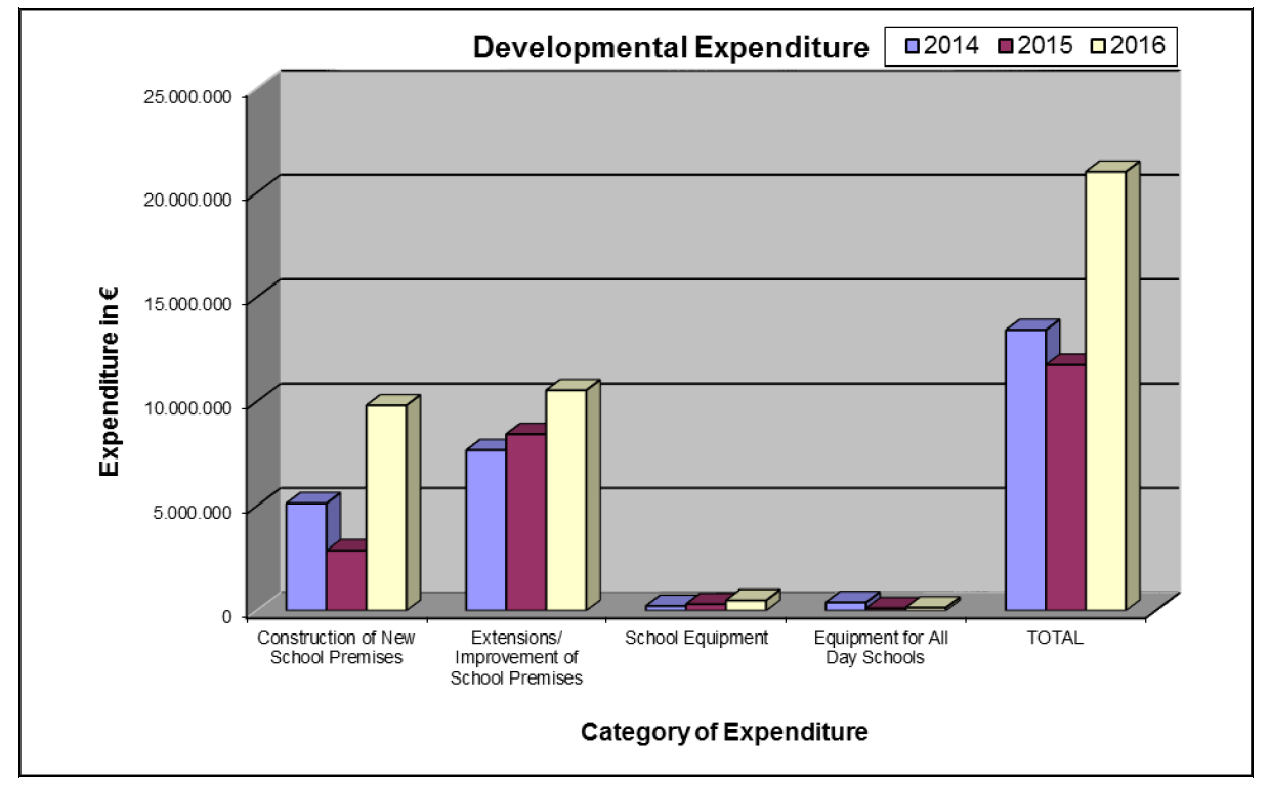Education Procurement in Cyprus
Numbers
More information| Number of schools K-12 | Number of teachers K-12 | Number of students K-12 | Number of computers per student K-12 |
| 1.333 (2017) | 14.955 (2017) | 188.311 (2017) | 0,5 |
| Sources: |
|||
| Statistics of Education 2016/2017 - STATISTICAL SERVICE | Statistics of Education 2016/2017 - STATISTICAL SERVICE | Statistics of Education 2016/2017 - STATISTICAL SERVICE | CrossNational Information and Communication Technology Policies and Practices in Education: Cyprus |
Legislation of Education
More informationThe right to education: Article 20 of the Constitution states that every person has the right to receive and every person or institution has the right to give instruction or education, provided that it will be in accordance with the Republic’s laws.
Compulsory education: Compulsory education lasts for ten years and extends from the age of 4 years and 8 months (pre-primary education) to the age of 15 years (end of lower secondary education).
Free education: Public education is free for all students in the age range of 4 years and 8 months to 18 years. Textbooks are also given to both students and teachers free of charge.
Public tertiary (non-university level) education is also free.
Public higher education (undergraduate level) is basically free for Cypriots and EU citizens, as the Government fully pays the fees which the Councils of the universities set. International undergraduate students from out with the EU countries pay fees.
Postgraduate students, Cypriot or international, pay fees set by the Council of Ministers.
Adult education offered in public institutions is to a large extent free. However, a large number of training courses, mostly offered by private or semi-government organisations, involve fees.
Governance: National legislation sets the aims and principles of education, the regulations of operation of schools or other educational institutions, examinations, funding and staff related issues.
Organisations
More information| Organization responsible for education | Role of the organization | Website |
| Ministry of Education and Culture (MoEC) |
|
www.moec.gov.cy/en |
| The Council of Minister | This is the highest authority in policy making in education. | |
| The Education Service Commission | This is an independent, five-member body, appointed by the President of the Republic for a six-year term. It is responsible for appointments, secondments, transfers, promotions and discipline (including dismissal) of teachers and school inspectors. | |
| The Local School Boards | These are responsible for the maintenance and equipment of the school buildings in collaboration with the Department of Technical Services of the Ministry of Education and Culture. | |
Source: European Commission / EACEA National Policies Platform / Eurydice / Cyprus Overview https://eacea.ec.europa.eu/national-policies/eurydice/content/cyprus_en |
||
Funding of education
More information| Funding of education | |
| Type of schools | Source of funds |
| Primary School | Ministry of Education and Culture |
| Lower Secondary School | Ministry of Education and Culture |
| Upper Secondary School | Ministry of Education and Culture |
| Post- secondary non tertiary education | Ministry of Education and Culture |
| Higher education | Higher Education Institutions (HEIs) in Cyprus receive funding both from public and private sources. The largest proportion of funding for public HEIs comes from the Ministry of Education and Culture. |
| Special education | Department for Social Inclusion of Persons with Disabilities |
| Second chance education | The Cyprus Ministry of Education and Culture, the Department of Secondary Technical and Vocational Education (STVE) |
| Adult education | The Cyprus Ministry of Education and Culture, the Department of Secondary Technical and Vocational Education (STVE) |
| Source: European Commission / EACEA National Policies Platform / Eurydice / Cyprus Overview https://eacea.ec.europa.eu/national-policies/eurydice/content/cyprus_en https://ec.europa.eu/education/sites/education/files/document-library-docs/et-monitor-report-2018-cyprus_en.pdf |
|
Public expenditure on education ISCED (2011) (million EUR)
More information| Year | Primary education | Lower secondary education | Upper secondary education | Total |
| 2012 | 386,1 | 242,1 | 278,3 | 906,5 |
| 2013 | 357,0 | 226,2 | 258,4 | 841,7 |
| 2014 | 353,9 | 221,3 | 251,4 | 826,6 |
| 2015 | 364,4 | 218,5 | 248,8 | 831,7 |
| 2016 | 380,9 | 222,2 | 254,2 | 857,3 |
| Source: Eurostat (online data codes: educ_uoe_fine01) | ||||
Expenditure on educational institutions ISCED (2011) (Million EUR)
More information| Year | Expenditure | Primary education | Lower secondary education | Upper secondary education | Total |
| 2012 | Current expenditure | 376,4 | 257,6 | 299,8 | 933,8 |
| Capital expenditure | 37,6 | 11,9 | 13,1 | 62,6 | |
| Total | 414,0 | 269,4 | 312,9 | 996,3 | |
| Share of capital expenditure (%) | 9,1 | 4,4 | 4,2 | 63 | |
| 2013 | Current expenditure | 366,3 | 2456,5 | 280,1 | 892,9 |
| Capital expenditure | 12,7 | 4,4 | 10,2 | 27,3 | |
| Total | 378,9 | 250,9 | 290,2 | 920,0 | |
| Share of capital expenditure (%) | 3,4 | 1,8 | 3,5 | 3,0 | |
| 2014 | Current expenditure | 366,6 | 241,4 | 273,9 | 881,9 |
| Capital expenditure | 9,1 | 4,1 | 90,2 | 22,4 | |
| Total | 375,7 | 245,4 | 283,1 | 904,2 | |
| Share of capital expenditure (%) | 2,4 | 1,7 | 3,2 | 2,5 | |
| 2015
|
Current expenditure | 370,3 | 242,0 | 274,7 | 887,0 |
| Capital expenditure | 17,8 | 5,2 | 11,4 | 34,4 | |
| Total | 388,1 | 247,1 | 286,0 | 921,2 | |
| Share of capital expenditure (%) | 4,6 | 2,1 | 4,0 | 3,7 | |
| 2016 | Current expenditure | 377,2 | 243,4 | 277,7 | 898,3 |
| Capital expenditure | 28,8 | 11,0 | 16,3 | 56,1 | |
| Total | 406,0 | 254,4 | 294,1 | 954,5 | |
| Share of capital expenditure (%) | 7,1 | 4,3 | 5,5 | 5,9 | |
| Source: Eurostat (online data code: educ_uoe_fini01) | |||||

Expenditure regarding education in Cyprus 2014-2016
Source:
Ministry of Education and Culture: Annual report - 2016
Investment plan for education / ICT in education
More information| Year | Amount in (€) | Main pillars of investments | Share of pillars (%)[2] |
| 2017 | 6% GDP |
|
Procurement Procedure
More informationProcurement system is decentralized with contracting authorities being responsible for their own tenders. There are about 700 contracting authorities. However, the legislative and review body is centralized at the state level, that is the Public Procurement Directorate (PPD) within the Cyprus Treasury. PPD has the following tasks and responsibilities:
- to draft public procurement legislation
- to ensure the implementation of public procurement legislation
- to support contracting authorities for proper implementation of the procurement rules
- to carry out checks on contracting authorities in order to ensure compliance with procurement law
- to issue compliance certificates to contracting authorities in case of projects with a value below the EU threshold
There are several bodies implementing public procurement procedures for contracting authorities at the state level. These bodies have different expertise.
- Department of Information Technology Services: responsible for purchasing IT products
- Department of Purchasing and Supply: responsible for procedures regarding common use products
- Department of Electromechanical Services: responsible for purchases of electromechanical products and for the Printing Office
Two central bodies appointed to control public procurement procedures besides PPD:
Audit Office of the Republic of Cyprus:
- Performs external controls of the execution of the national budget
- Supervises all the public-funded activities including public procurement documents, procedures and award decisions
- Publishes its finding in an annual report
- Does not have the right to issue sanctions or to launch judicial proceedings. It can notify the Attorney General if it finds out any violations in the procurement area
Internal Audit Service of the Republic of Cyprus: implements audits of public organizations and EU-funded programmes of Cyprus including public procurement procedures.
The Attorney General has the right to commence judicial proceedings where there is a legal issue.
Tenders Review Authority (TRA): Regarding public procurement decisions, appeals can be issued with TRA. It is responsible for maintaining equal treatment, transparency and non-discrimination. It has the right to cancel or amend award decisions.
Source:
Public procurement – Study on administrative capacity in the EU Cyprus Country Profile,
https://ec.europa.eu/regional_policy/sources/policy/how/improving-investment/public-procurement/study/country_profile/cy.pdf
LEA contact
More informationAndré Henriques
Startup Europe Regions Network
andre.henriques@startupregions.eu

